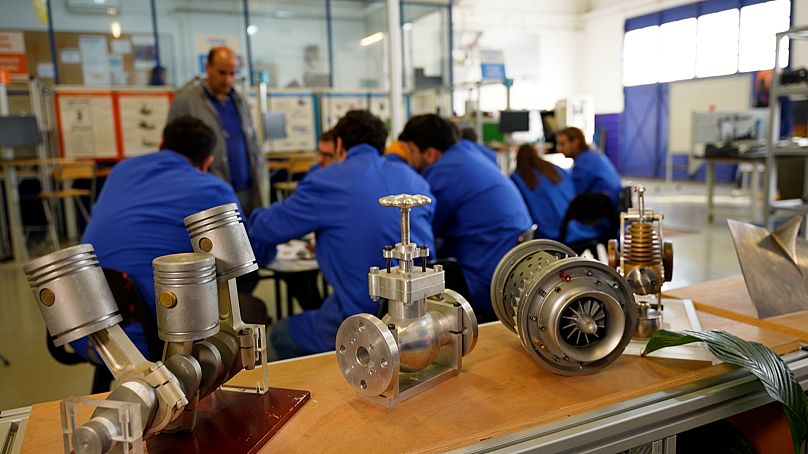In this episode of Real Economy, Euronews reporter Fanny Gauret travels across Europe to explore the challenges businesses are facing and how they are upskilling workers amid the digital and green transitions.
Approximately 63 per cent of small and medium-sized businesses in Europe say labour and skills shortages are holding them back in their general business activities, a recent Eurobarometer survey found.
 ADVERTISEMENT
ADVERTISEMENT
 ADVERTISEMENT
ADVERTISEMENT
In a bid to support European businesses, boost staff retention and equip professionals with the skills they need for the future, the European Commission and its partners announced at the Val Duchesse summit at the end of January that it had signed a 'Tripartite Declaration for a thriving European Social Dialogue'.
The EU has promised to bring more professionals to the European labour market, facilitate the recognition of foreign qualifications, improve working conditions and provide professionals with the tools they need to work in specialised roles.
Brussels is providing approximately €65 billion in EU funds for training. Thanks to the European Skills Agenda and the Pact for Skills, some two million workers across Europe have already received advanced training.
Creating a digital workforce in Slovenia
Rok Zajc, the CEO of Bold Group, a digital marketing agency in Ljubljana, told Euronews that he has been struggling to recruit certain profiles, especially highly-skilled professionals.
"We try to find different profiles from design, from performance marketing, from software developers and senior designers. But you need a lot of self-motivation and do some different courses to, let's say, come to the senior level, for the things that we are actually providing," Zajc said.
There are major staff shortages in the information and communication technology sector (ICT). The EU needs an additional 11 million people to join this sector if it is to reach its goal of acquiring 20 million ICT professionals by 2030.
"What the governments can and should do is also reskill the existing labour force, to make sure they get the skills that are needed," said Dr Emilija Stojmenova Duh, Slovenia's Minister of Digital Transformation.
The engineer-turned-politician explained to Euronews that 30,000 people in Slovenia availed of free courses last year to help them adapt and obtain the necessary skills to meet market demands.
"Only 17 per cent of the experts in ICT are female. So maybe my most favourite project is a digital one, which was about skilling and upskilling young women. We were collaborating with the industry so the industry was able to get the right workforce," said Stojmenova Duh.
Upskilling engineers in Portugal
Twenty-two per cent of employers across Europe's heavy industries say they cannot find the staff they need. The highly lucrative metallurgical and metalworking industry is also struggling to find professionals in Portugal with the right qualifications.
The sector has undergone a significant digital transformation. Robots currently do most of the heavy lifting, but the outdated notion still exists that this is a physically demanding sector.
Engineers and machine operators in this industry require technical skills. Nuno Teixeira the CEO of Alsil Group is trying to attract professionals domestically as well as from Portuguese-speaking countries.
"Companies, if they want to attract people, have to provide opportunities for individuals to evolve, to grow professionally, and balance it with their personal life as well," said Teixeira.
Eduardo and Rui are both CNC programming and operation technicians and were recently employed by the Alsil Group. Their careers went in a new direction after they enrolled in a professional training program at CENFIM, a public and private training centre supported by the European Social Fund Plus.
"It's a very challenging area, where new and demanding things come up every day, so it's something that has really captured my interest, and I see it as a promising future," said Rui who used to work as a geological engineer.
"In terms of employment, it represents about 230,000 jobs that have been evolving not only to adapt to new technologies but above all to respond to the work required," said Manuel Pinheiro Grilo, the director of CENFIM.
According to AIMMAP (The Association of Metallurgical, Metalworking and Related Industries of Portugal) Portugal's metallurgical companies are generating approximately €23 billion per year from its exports.
Empowering professionals to take charge of their careers
While upskilling professionals is of great benefit to companies looking to fill specialised roles, back in Slovenia, Minister Stojmenova Duh warned that the onus isn't just on public and private organisations who are racing against the clock to recruit professionals with the right skills.
"It's on us, on every individual, that we are aware that once we finish high school, faculty, it's not enough. The world is changing. We need to acquire new skills. So it is lifelong learning, something that we should really consider," she concluded.













